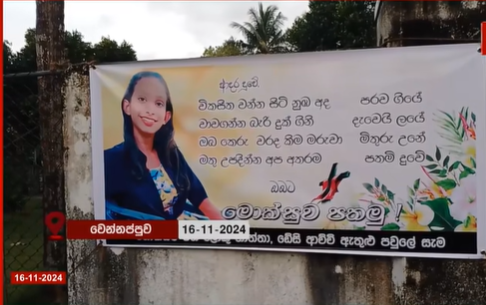A 16-year-old student dies after she was punished by her teachers
Ramisha Dinithi Thamel had returned late to class and, according to her teachers, had given inconsistent explanations. The teachers beat her and called for help only after an hour, even though she was unconscious. Even though the Ministry of Education condemns the practice, corporal punishment in schools is still widespread in Sri Lanka.
Colombo (AsiaNews) – The tragic death of a 16-year-old student at the hands of two teachers has deeply shaken public opinion in Sri Lanka, raising several questions about disciplinary practices used in school.
Ramisha Dinithi Thamel, a student at Martin and Forest College in Wennappuwa (an institution that welcomes children from low-income families in the country’s Northwestern Province) was physically assaulted on 9 August by the class and music teachers for leaving the classroom without permission and lying about it.
The girl was unconscious for about an hour, before the teachers, convinced that she was faking, called her parents.
Rushed to a hospital, Ramisha underwent surgery several times, transferred to three different hospitals, without ever regaining consciousness. She died on 13 November from cerebral haemorrhage following by the attack.
According to the investigation, Ramisha and a classmate had returned late and the girl was accused of giving inconsistent explanations.
"The teachers physically punished her, including beating her severely and forcing her to kneel in the sun. The severity of the attack led to her hospitalisation," said the police, who were unable to get a statement from Ramisha due to her critical conditions.
The two teachers involved, aged 39 and 57, were arrested immediately after the attack, released on bail in September. With the death of the student, they remanded in custody again on 14 November and referred to trial.
The use of physical punishment at school is still widespread in most schools in Sri Lanka.
“The ministry does not support or condone the use of punishments at a policy level,” said Education Ministry Secretary Nalaka Kaluwewa at a press briefing. Instead, “teachers are entrusted not only with imparting knowledge, but also with fostering a safe, supportive environment for students to thrive,” he added.
What is more, “Physical punishment, even in response to misconduct, is neither effective nor justified, as it can lead to devastating consequences.”
The secretary said that adequate measures will be taken to prevent more tragedies of this kind.
This episode highlights teachers’ “failure to recognise the mental and physical impact of their actions on vulnerable children,” said human rights lawyers Sapumali Caldera and Nishantha Wijesekara, speaking to AsiaNews. “We are prepared to offer free legal consultation to the family as they are from a low-income background.”
For them, “It is necessary to understand the diverse backgrounds and emotional requirements of students to address behavioural issues with empathy and professionalism. Especially, teachers must prioritise the well-being of their students, ensuring that every action taken reflects their role as mentors and protectors, instead of relying on punishments.”
03/04/2023 17:31
10/07/2018 09:55
23/02/2019 08:14







.png)










